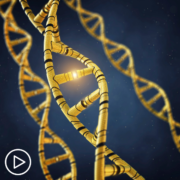What Are the Benefits of MPN Inhibitor Treatment?
What Are the Benefits of MPN Inhibitor Treatment? from Patient Empowerment Network on Vimeo.
MPN expert Dr. John Mascarenhas shares an overview of how inhibitor therapy works to treat myelofibrosis (MF) and the benefits of this type of treatment.
Dr. John Mascarenhas is Associate Professor of Medicine at the Icahn School of Medicine at Mount Sinai (ISMMS) and the Director of the Adult Leukemia Program and Leader of Clinical Investigation within the Myeloproliferative Disorders Program at Mount Sinai. Learn more about Dr. Mascarenhas, here.
Related Programs

|

Which Gene Mutations Impact Myelofibrosis Treatment Options? |

What Are the Considerations When Choosing Myelofibrosis Therapy? |
Transcript
Katherine Banwell:
Dr. Mascarenhas, what is inhibitor therapy and how does that work?
Dr. Mascarenhas:
So, inhibitor therapy in general are usually oral drugs for the most part, small molecule inhibitors that are geared and usually specific but not totally specific because then they can have off-target effects, but geared to inhibiting usually an enzyme that is overactive or is contributing to the pathophysiology of the disease.
I think in MF, probably one of the best examples is a JAK2 inhibitor. So, there are a number of JAK2 inhibitors that have been in clinical testing. There are two that are approved, ruxolitinib and fedratinib which are excellent drugs in inhibiting JAK2 protein itself in the cells that could be either upregulated or hyperactive in the signaling pathway, and it quiets down a signaling pathway in the hematopoietic cells that leads to a lot of the manifestations of the disease, namely symptoms and spleen.
So, one of the clear benefits of JAK inhibitors that was established many years ago and reinforced by multiple drugs that are either approved or in late-stage testing is these drugs are excellent in improving the symptom burden in the patients and reducing their spleen. Unfortunately, as a class, we’ve not seen these drugs induce remissions or cure patients. So, there’s still interest in developing, obviously, non-JAK inhibitor therapies. But inhibitors in general are inhibiting proteins that are either inappropriately activated or part of a cascade of signaling molecules that are contributing to the disease.
And they are not chemotherapeutic, which might be an important point to make. In past days, we’ve relied heavily in hematologic malignancies in using chemotherapies which are nonspecific and just kill dividing cells whereas inhibitors typically are targeted, and in some sense, it’s personalized to the disease with toxicity profiles that are usually quite distinct from the traditional chemotherapies that we use.



